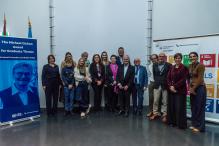Abstract
This dissertation examines the persistence of poverty under the influence of global crises and effective ways to reduce poverty, within the framework of poverty traps. Through case studies from various socio-economic and geographical contexts—including Sub-Saharan Africa, Paraguay, and Jordan—it investigates how external factors such as urbanisation, weather shocks, and the unintended effects of social protection design contribute to chronic and transitory poverty. The overarching research question of this dissertation is: How do global crises influence the persistence of poverty, and what strategies can promote sustainable poverty reduction?
Global poverty has been reduced dramatically in recent decades thanks to rapid economic growth, technological advances and targeted policies. However, since the COVID-19 pandemic and due to other global crises such as climate change and recent conflicts, the gains in poverty reduction have slowed down, if not are being reversed in many regions. For many households, escaping poverty can be an insurmountable task due to various and multidimensional barriers, leaving them trapped in poverty. Poverty traps are thus the socio-economic conditions under which households struggle to escape poverty, or remain vulnerable to falling back. This dissertation focuses on three types of external factors and how they relate to the notion of poverty traps, namely urbanisation, climate-induced and other economic shocks, and social assistance schemes.
The first empirical chapter analyses consumption- and asset-based poverty traps in urban areas of Nigeria, Tanzania, and Ethiopia. It finds no evidence of multiple equilibria, but highlights that the poorest seem to be left behind, and considerable risk of falling back into poverty among near-poor, vulnerable households remains. The chapter thus argues that urban poverty is not necessarily characterised by fixed constraints, but rather by high levels of volatility, and calls for a shift in how urban poverty is measured and understood, particularly in the context of rapid urbanisation and growing informal settlements.
The second chapter examines poverty and vulnerability dynamics in Paraguay over the past two decades using synthetic panel methods. It finds a relative shift from chronic to transient poverty over time, especially during economic shocks such as the COVID-19 pandemic. Chronic poverty and overall downward mobility are increasingly concentrated among certain subgroups, particularly rural and agricultural households, hinting at poverty traps among certain groups.
Chapter three explores the effects of short-term weather shocks on poverty in Paraguay. Findings show that flooding, droughts, and extreme temperatures not only increase poverty rates but also deepen extreme poverty, with multiplier effects especially in rural areas. These shocks also reduce income among the vulnerable middle, particularly in agricultural households and densely populated urban areas with poor infrastructure, advancing our understanding of poverty persistence under worsening climate change.
Chapter four evaluates Jordan’s Unified Cash Transfer (UCT) programme using administrative data and a combination of quasi-experimental methods. While the UCT improves children’s schooling, it does not significantly enhance income or asset accumulation, suggesting the presence of poverty trap mechanisms. The chapter highlights how social protection programme design and targeting are important to ensure poverty reduction, rather than a perpetuation of poverty traps, and how administrative data with sufficient quality can be fundamental for evaluating and improving policy design.
Collectively, the findings from this dissertation illustrate the complex interplay between structural constraints, external shocks, and social protection in reducing the persistence of poverty. Through innovative methodological approaches and rich empirical analyses, this dissertation provides a cross-country perspective on poverty persistence under global crises and offers new insights into effective pathways for sustainable poverty reduction.
About the author:
Teresa is a PhD Fellow at UNU-MERIT since 2020. Her main research interests include social protection and poverty. In her PhD she is exploring urban poverty traps, the impact of weather shocks on poverty, and the link between social protection programmes and poverty in various countries. Teresa is working under the supervision of Prof. Dr. Franziska Gassman, Dr. Zina Nimeh and Dr. Britta Augsburg (IFS, UK). Prior to joining the PhD programme, Teresa worked for the Social Protection and Policy department at UNICEF Jordan, where she contributed to a cash transfer programme as well as various research studies and reports. She holds a Master’s degree in Public Policy and Human Development with specialisation in Social Protection Policy from UNU-MERIT and a Bachelor’s degree in International Business with specialisation in Emerging Markets from Maastricht University’s School of Business and Economics.

